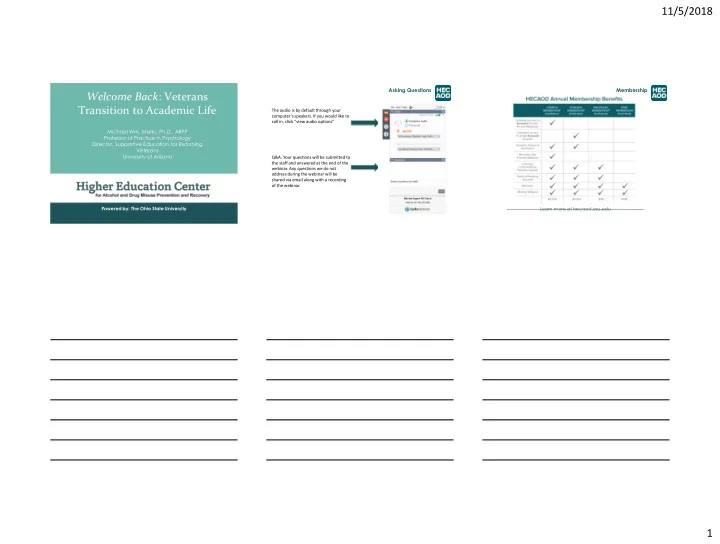

11/5/2018 Asking Questions Membership Welcome Back : Veterans Transition to Academic Life The audio is by default through your computer’s speakers. If you would like to call in, click “view audio options” Michael Wm. Marks, Ph.D., ABPP Professor of Practice in Psychology Director, Supportive Education for Returning Veterans University of Arizona Q&A: Your questions will be submitted to the staff and answered at the end of the webinar. Any questions we do not address during the webinar will be shared via email along with a recording of the webinar. Powered by: The Ohio State University Learn more at hecaod.osu.edu 1
11/5/2018 Our Presenter When you hear the term: VETERAN, what is the first word that comes to mind? WORD CLOUD !! Go to www.menti.com Enter Code 841276 Michael Wm. Marks, Ph.D., ABPP Professor of Practice in Psychology Director, Supportive Education for Returning Veterans University of Arizona 2
11/5/2018 Student Veterans and Civilian Student Drinking Symptoms of PTS Symptoms of PTS Patterns Consumption amounts are similar between The person experienced, witnessed or was groups. confronted with an event that involved the actual or threatened death or serious injury, or Can be caused by experiencing or witnessing a threat to the physical integrity of self or events in which serious physical harm occurs others. or is threatened. The person's response to the event involved intense fear, helplessness, or horror. 3
11/5/2018 Clash of Cultures PTS in the Classroom Military Civilian Military vs. Campus: Perception of Traits High level of order Veterans may: Much less order in life/campus Commanding Officer (CO) has Military Environment Campus Environment Have to plan out their own Sit in the back of the classroom so they can all the answers, day Day is planned out by Hyper vigilant, watchful have a clear view of everything around them Have to be their own ‘ CO ’ Aware, alert, scanning someone else Be easily startled by noises (pens dropping, Suspicious, guarded, Less Responsibilities on Be careful who you trust Great Responsibilities shuffling in a backpack, whispering or other stand-offish campus Millions of dollars of equipment English homework is not ‘ life noises from classmates) Lives dependent upon them Reactivity, impulsivity No time to think, must act or death ’ Be withdrawn from class discussion Inflexibility and Daily Critical Choices No Daily critical choices Have difficulty maintaining emotional control Discipline and obeying orders Life and death decisions- demanding Do I go to class or not? literally during difficult topics Who is impacted? Physically isolates, back to Keeps strangers away wall 4
11/5/2018 PTSD to PTG: A Continuum Engage Educate Can only find negatives in their trauma • Is able to find the positive in their • experiences. traumatic experience and use it to build hope and a personal sense of • Victims use their traumatic experiences as justification for continuing self- well-being. destructive thoughts and behaviors. SERV Leadership They also blame others for their current PALS – Mentoring • Survivors accept personal responsibility difficulties. for controlling their self-destructive Philosophy Department Victims have excessive self-blame/guilt Faculty Fellows thoughts and behaviors. • about traumatic events. They engage ENR/DoD Grant in a lot of “should - a”, “could - a”, “if • Survivors accept that he or she did the Warrior Scholar Project only” kinds of thinking, which are best that they could in a difficult judgmental and condemning. UA Veterans Alliance – Green situation. They are able to have Honor Flight • Victims discount other peoples suffering compassion for themselves and use Zone Training. by comparing traumas. This is the old more accurate thinking about “my trauma is worse than your trauma” game. This can also manifest itself Veteran History Project themselves and the situation they were when veterans return home and do not in. understand the terror that spouses and children endured in their absence. • Survivors are able to demonstrate sensitivity to other kinds of personal suffering. Video #1 5
11/5/2018 Empower Why We Do This Leadership Projects TOP SVA Women Veterans Project Mentorship – ENR,PALS, Honor College Video #3 Video #2 6
11/5/2018 Connect with HECAOD! [ @ HECAOD ] Questions? Follow us for the latest research and news, information on upcoming events and training resources to support your campus. WEB: hecaod.osu.edu EMAIL: hecaod@ osu.edu PHONE: 61 4-292-5572 HEC AOD Higher Education Center for Alcohol and Drug Misuse Prevention and Recovery 7
Recommend
More recommend